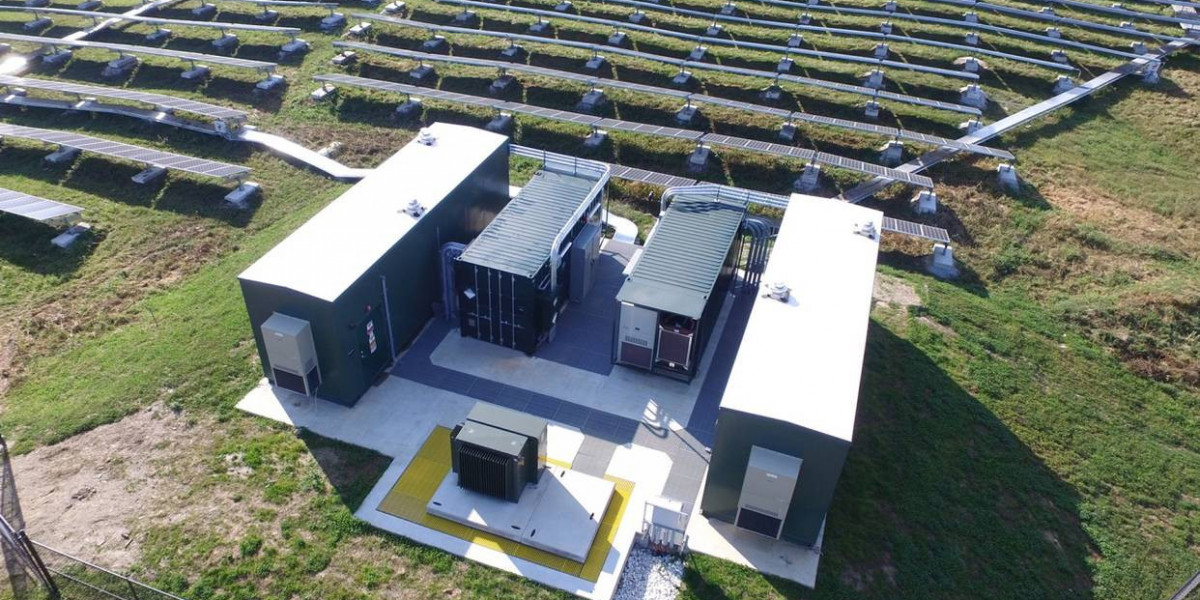The United Kingdom Advanced Energy Storage Systems Market is experiencing robust growth, driven by the increasing need for energy resilience, grid stability, and the integration of renewable energy sources. As the UK transitions to a low-carbon energy future, advanced energy storage technologies are becoming critical to ensuring efficient energy usage and optimizing power supply. The United Kingdom Advanced Energy Storage Systems Market plays a vital role in helping the country meet its ambitious renewable energy goals while enhancing the reliability of the energy grid. This article explores the key trends, market dynamics, and opportunities shaping the future of advanced energy storage systems in the UK.
Market Overview
The United Kingdom has long been a leader in the development and deployment of clean energy technologies, and advanced energy storage systems are no exception. With increasing investments in renewable energy, such as wind and solar power, the need to store excess energy during periods of low demand and release it during peak consumption times has become essential. Advanced energy storage systems allow for this balance, ensuring that renewable energy can be utilized efficiently and reliably.
Growth Drivers
Several factors are propelling the growth of the United Kingdom Advanced Energy Storage Systems Market:
Renewable Energy Integration: As the UK continues to expand its renewable energy capacity, energy storage systems are key to addressing the intermittent nature of renewable energy sources like wind and solar. These systems help store surplus energy generated during times of high production and release it when demand exceeds supply, ensuring a stable and reliable power grid.
Government Policies and Incentives: The UK government has made significant strides in supporting clean energy technologies, including advanced energy storage. Initiatives such as subsidies, grants, and long-term energy strategies like the "Net Zero" target for 2050 encourage the development and adoption of energy storage solutions. These policies are designed to accelerate the deployment of energy storage systems across various sectors, from residential to industrial.
Technological Advancements: Advancements in energy storage technology, particularly in battery chemistry and storage capacity, have made these systems more efficient and cost-effective. The development of lithium-ion, solid-state, and flow batteries has made it possible to store and discharge energy more effectively, lowering costs and improving overall performance.
Grid Modernization and Resilience: The UK's aging energy infrastructure has prompted calls for modernization, with energy storage systems being a crucial component of these upgrades. By deploying advanced energy storage solutions, the grid can handle fluctuations in energy demand more efficiently, reduce the risk of outages, and improve the overall resilience of the energy system.
Corporate and Industrial Adoption: The private sector is increasingly investing in energy storage systems to optimize energy costs and enhance sustainability efforts. Businesses across various industries are leveraging these systems to reduce dependence on traditional power sources, lower operational costs, and mitigate the risks of energy price volatility.
Market Segmentation
The United Kingdom Advanced Energy Storage Systems Market can be segmented based on technology type, application, and end-user industry. This segmentation helps provide a clearer understanding of the diverse needs and opportunities within the market.
By Technology Type
Lithium-Ion Batteries: Lithium-ion batteries are the most widely used energy storage technology in the UK market, particularly in both residential and commercial applications. Known for their high energy density, long cycle life, and rapid charge/discharge capabilities, lithium-ion batteries dominate the market due to their reliability and performance.
Flow Batteries: Flow batteries, including vanadium redox and zinc-bromine, are gaining traction as long-duration storage solutions. These batteries are ideal for large-scale applications and grid storage, as they can store energy for extended periods and are less affected by degradation compared to lithium-ion batteries.
Solid-State Batteries: Solid-state batteries are an emerging technology in the advanced energy storage sector, offering higher energy density, enhanced safety, and longer lifespan compared to traditional liquid-based batteries. While still in the early stages of development, solid-state batteries have the potential to revolutionize the market.
Compressed Air Energy Storage (CAES): CAES involves storing energy by compressing air in underground caverns or tanks and releasing it to generate electricity when needed. While not as widely adopted as battery storage, CAES offers significant potential for large-scale, grid-level energy storage solutions.
By Application
Grid Storage: Advanced energy storage systems are widely used for grid stabilization, providing backup power, and supporting load leveling. These systems help manage supply-demand imbalances, facilitate the integration of renewable energy, and enhance grid resilience.
Residential Storage: Homeowners in the UK are increasingly adopting residential energy storage systems to store solar energy generated during the day and use it during peak hours in the evening. This enables consumers to reduce reliance on the grid, lower energy bills, and increase their energy independence.
Industrial Storage: In industrial settings, energy storage systems are used to optimize energy consumption, reduce demand charges, and improve operational efficiency. These systems are often paired with renewable energy installations to ensure uninterrupted power supply for critical operations.
Electric Vehicles (EVs): Energy storage technologies play a crucial role in the electric vehicle market. As EV adoption increases, the demand for advanced battery technologies and charging infrastructure is expected to grow, offering significant opportunities for energy storage manufacturers.
By End-User Industry
Utilities: Utility companies are investing heavily in advanced energy storage systems to enhance grid stability and facilitate the integration of renewable energy sources. These systems help utilities manage peak demand, reduce energy losses, and improve overall system reliability.
Commercial and Residential: As mentioned, both residential and commercial sectors are key adopters of energy storage systems. In the commercial sector, businesses are investing in energy storage to lower operational costs and improve sustainability. For residential consumers, storage solutions offer a way to store excess energy from solar power systems and provide energy security.
Transportation: The transportation sector, particularly electric vehicles, relies on advanced energy storage technologies to power vehicles efficiently. Battery manufacturers are focusing on increasing the energy density and lifespan of batteries to meet the growing demand for electric vehicles.
Challenges in the United Kingdom Advanced Energy Storage Systems Market
While the UK advanced energy storage market is poised for growth, there are several challenges that could hinder its development.
High Initial Costs
Despite falling costs for battery technologies, the upfront capital investment for advanced energy storage systems remains relatively high. This can be a barrier to adoption, particularly for residential and small-scale commercial users. Government incentives and financing options are essential to address this challenge.
Limited Long-Term Storage Solutions
While current technologies like lithium-ion batteries are effective for short-term storage, solutions for long-duration storage remain a challenge. Technologies such as flow batteries and pumped hydro storage are being explored, but they are not yet as widely deployed as lithium-ion systems.
Regulatory and Market Barriers
The regulatory environment in the UK can sometimes present barriers to the widespread deployment of energy storage systems. While there have been efforts to create favorable policies, further regulatory clarity and market incentives are necessary to encourage large-scale adoption.
Future Outlook and Opportunities
The future of the United Kingdom Advanced Energy Storage Systems Market looks bright, with several trends and opportunities on the horizon.
Increased Government Support: The UK government’s commitment to achieving net-zero emissions by 2050 and its continued support for clean energy technologies will provide a favorable environment for energy storage development. Policies that encourage investment in energy storage and renewable energy integration will continue to drive market growth.
Technological Innovation: Ongoing advancements in battery technologies, such as solid-state batteries and longer-duration storage solutions, will improve the performance and cost-effectiveness of energy storage systems. These innovations will further boost the adoption of energy storage across various sectors.
Expansion of Electric Vehicle Market: As the UK pushes for greater adoption of electric vehicles, energy storage solutions will play a key role in supporting EV infrastructure. This will create new opportunities for battery manufacturers and storage companies.
Decentralized Energy Systems: With the rise of distributed energy resources (DERs) like solar panels and wind turbines, energy storage systems will become integral to decentralized energy grids. This shift towards local energy generation and storage will create new opportunities for residential and commercial applications.
Conclusion
The United Kingdom Advanced Energy Storage Systems Market is set to continue its growth trajectory as the demand for efficient, sustainable, and resilient energy solutions rises. Driven by technological advancements, government policies, and the growing need for renewable energy integration, the market presents significant opportunities for innovation and investment. However, challenges such as high initial costs and regulatory hurdles must be addressed to unlock the full potential of advanced energy storage in the UK. With a supportive policy framework and ongoing technological developments, the UK is well-positioned to become a leader in the global energy storage revolution.
More Trending Reports









